大一大学英语第一单元内容
- 格式:doc
- 大小:77.00 KB
- 文档页数:7
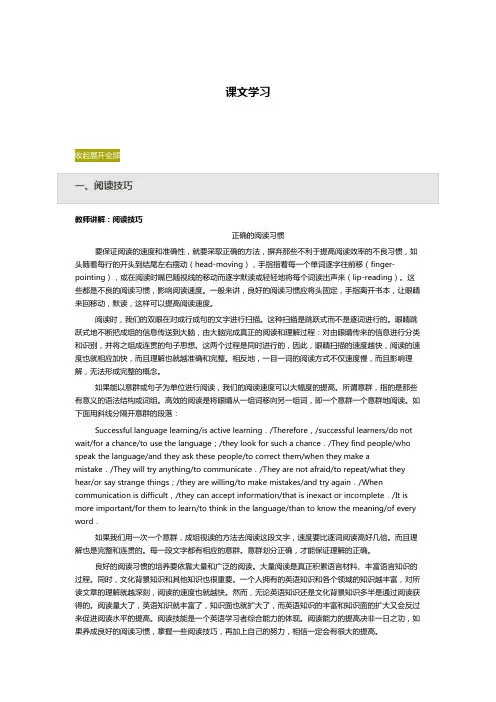
课文学习教师讲解:阅读技巧正确的阅读习惯要保证阅读的速度和准确性,就要采取正确的方法,摒弃那些不利于提高阅读效率的不良习惯,如头随着每行的开头到结尾左右摆动(head-moving),手指指着每一个单词逐字往前移(finger-pointing),或在阅读时嘴巴随视线的移动而逐字默读或轻轻地将每个词读出声来(lip-reading)。
这些都是不良的阅读习惯,影响阅读速度。
一般来讲,良好的阅读习惯应将头固定,手指离开书本,让眼睛来回移动,默读,这样可以提高阅读速度。
阅读时,我们的双眼在对成行成句的文字进行扫描。
这种扫描是跳跃式而不是逐词进行的。
眼睛跳跃式地不断把成组的信息传送到大脑,由大脑完成真正的阅读和理解过程:对由眼睛传来的信息进行分类和识别,并将之组成连贯的句子思想。
这两个过程是同时进行的,因此,眼睛扫描的速度越快,阅读的速度也就相应加快,而且理解也就越准确和完整。
相反地,一目一词的阅读方式不仅速度慢,而且影响理解,无法形成完整的概念。
如果能以意群或句子为单位进行阅读,我们的阅读速度可以大幅度的提高。
所谓意群,指的是那些有意义的语法结构或词组。
高效的阅读是将眼睛从一组词移向另一组词,即一个意群一个意群地阅读。
如下面用斜线分隔开意群的段落:Successful language learning/is active learning./Therefore,/successful learners/do not wait/for a chance/to use the language;/they look for such a chance./They find people/who speak the language/and they ask these people/to correct them/when they make a mistake./They will try anything/to communicate./They are not afraid/to repeat/what they hear/or say strange things;/they are willing/to make mistakes/and try again./When communication is difficult,/they can accept information/that is inexact or incomplete./It is more important/for them to learn/to think in the language/than to know the meaning/of every word.如果我们用一次一个意群,成组视读的方法去阅读这段文字,速度要比逐词阅读高好几倍。
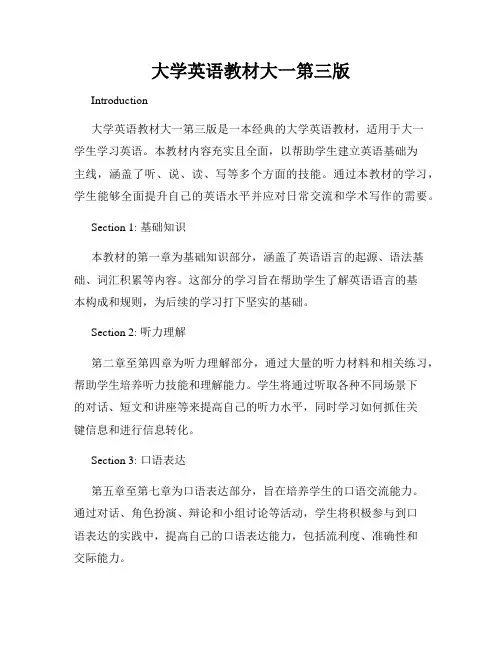
大学英语教材大一第三版Introduction大学英语教材大一第三版是一本经典的大学英语教材,适用于大一学生学习英语。
本教材内容充实且全面,以帮助学生建立英语基础为主线,涵盖了听、说、读、写等多个方面的技能。
通过本教材的学习,学生能够全面提升自己的英语水平并应对日常交流和学术写作的需要。
Section 1: 基础知识本教材的第一章为基础知识部分,涵盖了英语语言的起源、语法基础、词汇积累等内容。
这部分的学习旨在帮助学生了解英语语言的基本构成和规则,为后续的学习打下坚实的基础。
Section 2: 听力理解第二章至第四章为听力理解部分,通过大量的听力材料和相关练习,帮助学生培养听力技能和理解能力。
学生将通过听取各种不同场景下的对话、短文和讲座等来提高自己的听力水平,同时学习如何抓住关键信息和进行信息转化。
Section 3: 口语表达第五章至第七章为口语表达部分,旨在培养学生的口语交流能力。
通过对话、角色扮演、辩论和小组讨论等活动,学生将积极参与到口语表达的实践中,提高自己的口语表达能力,包括流利度、准确性和交际能力。
Section 4: 阅读理解第八章至第十章为阅读理解部分,通过大量的阅读材料和相关练习,帮助学生提高阅读能力和阅读理解能力。
学生将接触到各种题材的文章,包括新闻报道、科技文章、文学作品等,通过阅读理解活动,培养自己的理解能力和分析思维。
Section 5: 写作能力第十一章至第十三章为写作能力部分,学生将学习如何进行写作训练,包括写作结构、写作风格、语法运用等方面的内容。
学生将通过写作练习,提高自己的写作能力,包括应对日常生活和学术写作的需要。
Section 6: 综合能力训练第十四章为综合能力训练部分,通过综合性的练习和评估,帮助学生综合运用所学的听、说、读、写等技能。
学生将在这个部分进行模拟测试,检测自己的学习成果,同时针对不足之处进行补充和提高。
Conclusion大学英语教材大一第三版是一本内容全面、结构科学的教材,通过系统的学习,可以帮助学生全面提升听、说、读、写等多个方面的英语能力。
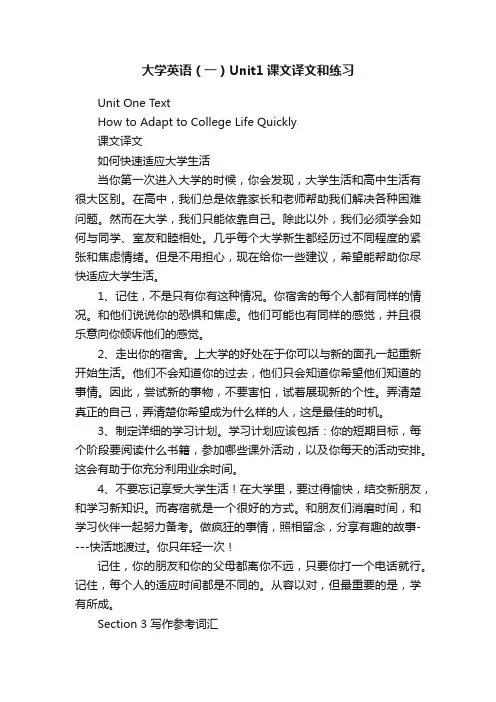
大学英语(一)Unit1课文译文和练习Unit One TextHow to Adapt to College Life Quickly课文译文如何快速适应大学生活当你第一次进入大学的时候,你会发现,大学生活和高中生活有很大区别。
在高中,我们总是依靠家长和老师帮助我们解决各种困难问题。
然而在大学,我们只能依靠自己。
除此以外,我们必须学会如何与同学、室友和睦相处。
几乎每个大学新生都经历过不同程度的紧张和焦虑情绪。
但是不用担心,现在给你一些建议,希望能帮助你尽快适应大学生活。
1、记住,不是只有你有这种情况。
你宿舍的每个人都有同样的情况。
和他们说说你的恐惧和焦虑。
他们可能也有同样的感觉,并且很乐意向你倾诉他们的感觉。
2、走出你的宿舍。
上大学的好处在于你可以与新的面孔一起重新开始生活。
他们不会知道你的过去,他们只会知道你希望他们知道的事情。
因此,尝试新的事物,不要害怕,试着展现新的个性。
弄清楚真正的自己,弄清楚你希望成为什么样的人,这是最佳的时机。
3、制定详细的学习计划。
学习计划应该包括:你的短期目标,每个阶段要阅读什么书籍,参加哪些课外活动,以及你每天的活动安排。
这会有助于你充分利用业余时间。
4、不要忘记享受大学生活!在大学里,要过得愉快,结交新朋友,和学习新知识。
而寄宿就是一个很好的方式。
和朋友们消磨时间,和学习伙伴一起努力备考。
做疯狂的事情,照相留念,分享有趣的故事----快活地渡过。
你只年轻一次!记住,你的朋友和你的父母都离你不远,只要你打一个电话就行。
记住,每个人的适应时间都是不同的。
从容以对,但最重要的是,学有所成。
Section 3 写作参考词汇faculty 学院department 系/部,institute 学院/研究院campus 校园,laboratory/lab 实验室auditorium 会堂/礼堂, gymnasium 体育馆/健身室information desk 咨询处library 图书馆art center 艺术中心clinic 医务室laundry room 洗衣室dining hall 食堂common room 公共休息室Administration Office 管理办公室computer center 计算机网络中心Student Accommodation Center 学生住宿管理中心audio-visual resource center 音像资料中心Law School 法学院Medical School 医学院Business School 商学院Faculty of EnglishLanguage and Culture英语语言文化学院Faculty of ElectronicEngineering电子工程学院Chemistry Department 化学系Faculty of Social Studies 社会学学院Mathematics Department 数学系Physics Department 物理系Physical Science Department自然科学系Management Institute管理学院Education Institute 教育学院Students’ Union学生会society社团registration form注册表membership application会员资格申请Recreation Center娱乐室Sports Hall 体育馆Activity Room 活动室playing fields 比赛场地tennis court 网球场football field 足球场volleyball 排球badminton 羽毛球racket 球拍Task 3 Give brief answers to the following questions. (p4)1. How do students solve all kinds of difficult problems at college?Students have to rely on themselves.2. How do most college freshmen feel when they first enter college?They experience some level of nervousness and anxiety.3. What does a detailed study plan usually include?It should include a student’s short-term goals, what books to read at a certain stage, what extra curriculum activities to participate in and daily activities.4. What is college about according to the passage?College is about having fun and making new friends as well as learning new knowledge.5. What could new students do when they are in need of help to adjust to the new environment?Just give a phone call to their friends and parents who are always ready to help.6. How do you adapt to your college life?OpenTask 6 Read the English sentences and translate the Chinesesentences into English.( P6)1. What's more, we should learn to live independently.What's more, we lack necessary experience.2. Chances are that man will eventually land on Mars.Chances are that Grace will not come to the meeting.3. For this reason, many of his former friends turned against him.For this reason, I have decided to take teaching as my future career.4. This is a great time not only to learn new knowledge but also to developourselves in all aspects.This is a great time not only to relax oneself but also to experience new things.5. Reading English aloud in the morning will do you a lot of good.Cheating in an exam ruins one's personality.Section 4 Activity 2 Task 1 (p14)1) This is my friend Mary. She is a student at Binhai Technical School.这是我们的新老师史密斯先生,他来自澳大利亚。
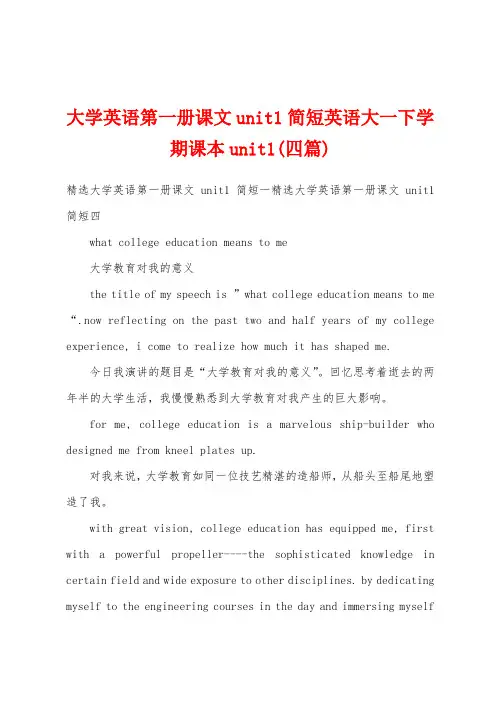
大学英语第一册课文unit1简短英语大一下学期课本unit1(四篇)精选大学英语第一册课文unit1简短一精选大学英语第一册课文unit1简短四what college education means to me大学教育对我的意义the title of my speech is ”what college education means to me “.now reflecting on the past two and half years of my college experience, i come to realize how much it has shaped me.今日我演讲的题目是“大学教育对我的意义”。
回忆思考着逝去的两年半的大学生活,我慢慢熟悉到大学教育对我产生的巨大影响。
for me, college education is a marvelous ship-builder who designed me from kneel plates up.对我来说,大学教育如同一位技艺精湛的造船师,从船头至船尾地塑造了我。
with great vision, college education has equipped me, first with a powerful propeller----the sophisticated knowledge in certain field and wide exposure to other disciplines. by dedicating myself to the engineering courses in the day and immersing myselfin the rich banquet of the world literature at night, i”ve amassed the driving force for the future and enriched my soul.首先,具有远见卓识的大学教育为我装配了一只马力强劲的推动器;精深的专业学问及广博的课外学问给我带来无限动力。
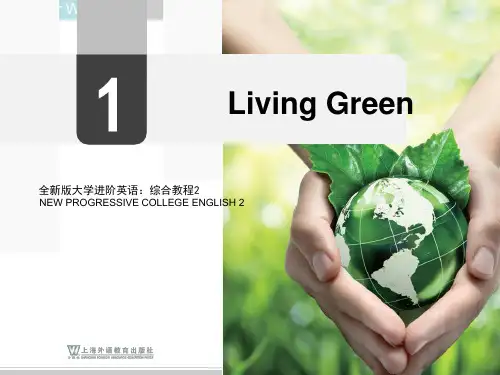

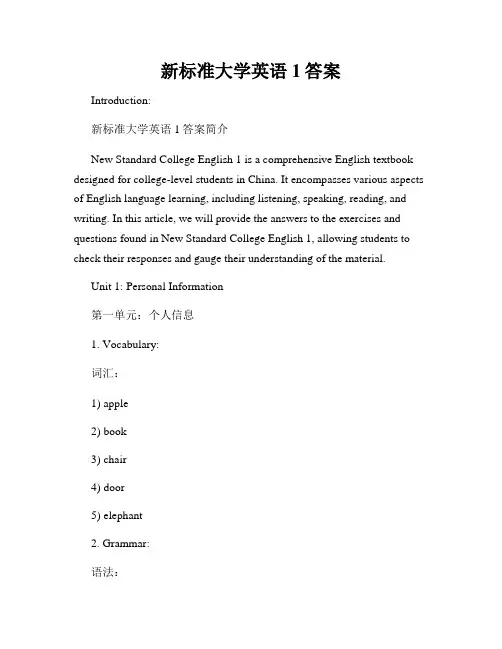
新标准大学英语1答案Introduction:新标准大学英语1答案简介New Standard College English 1 is a comprehensive English textbook designed for college-level students in China. It encompasses various aspects of English language learning, including listening, speaking, reading, and writing. In this article, we will provide the answers to the exercises and questions found in New Standard College English 1, allowing students to check their responses and gauge their understanding of the material.Unit 1: Personal Information第一单元:个人信息1. Vocabulary:词汇:1) apple2) book3) chair4) door5) elephant2. Grammar:语法:1) He is a student.2) She is my sister.3) They are teachers.4) We are friends.5) I am an engineer.3. Listening:听力:1) B2) A3) C4) B5) CUnit 2: Daily Life第二单元:日常生活1. Vocabulary:词汇:1) breakfast2) lunch3) dinner5) vegetables2. Grammar:语法:1) I wake up at 7:00 am every day.2) She brushes her teeth before going to bed.3) They have lunch at 12:30 pm.4) We go to the gym in the evening.5) He reads a book before sleeping.3. Listening:听力:1) C2) B3) A4) A5) BUnit 3: Leisure Activities第三单元:休闲活动1. Vocabulary:1) swimming2) dancing3) painting4) hiking5) cooking2. Grammar:语法:1) She enjoys swimming in the pool.2) They like dancing at parties.3) He loves painting landscapes.4) We go hiking in the mountains.5) I enjoy cooking Italian cuisine. 3. Listening:听力:1) B2) C3) A4) BUnit 4: Travel第四单元:旅行1. Vocabulary:词汇:1) airplane2) hotel3) passport4) suitcase5) destination2. Grammar:语法:1) I am going to Europe next month.2) She will stay at a five-star hotel.3) They have their passports ready.4) We need to pack our suitcases.5) He is excited to explore a new destination.3. Listening:听力:2) A3) B4) B5) AConclusion:结论This article has provided the answers to exercises and questions found in the first four units of New Standard College English 1. By referring to this article, students can check their responses and assess their progress in learning English. Remember to practice regularly and utilize the accompanying materials provided by the textbook to further enhance your language skills. Good luck with your English language learning journey!。
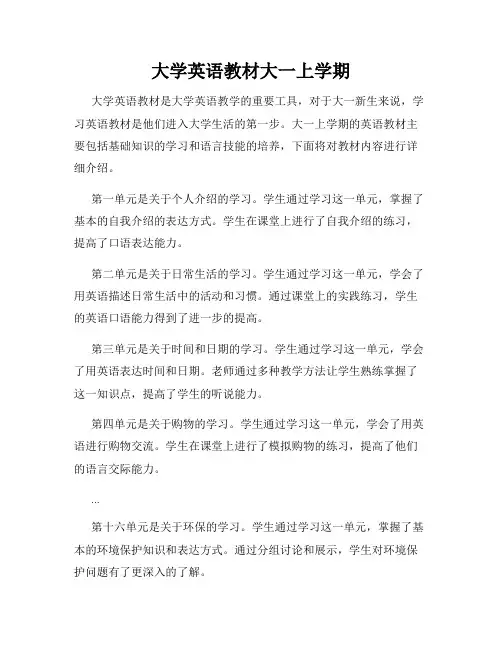
大学英语教材大一上学期大学英语教材是大学英语教学的重要工具,对于大一新生来说,学习英语教材是他们进入大学生活的第一步。
大一上学期的英语教材主要包括基础知识的学习和语言技能的培养,下面将对教材内容进行详细介绍。
第一单元是关于个人介绍的学习。
学生通过学习这一单元,掌握了基本的自我介绍的表达方式。
学生在课堂上进行了自我介绍的练习,提高了口语表达能力。
第二单元是关于日常生活的学习。
学生通过学习这一单元,学会了用英语描述日常生活中的活动和习惯。
通过课堂上的实践练习,学生的英语口语能力得到了进一步的提高。
第三单元是关于时间和日期的学习。
学生通过学习这一单元,学会了用英语表达时间和日期。
老师通过多种教学方法让学生熟练掌握了这一知识点,提高了学生的听说能力。
第四单元是关于购物的学习。
学生通过学习这一单元,学会了用英语进行购物交流。
学生在课堂上进行了模拟购物的练习,提高了他们的语言交际能力。
...第十六单元是关于环保的学习。
学生通过学习这一单元,掌握了基本的环境保护知识和表达方式。
通过分组讨论和展示,学生对环境保护问题有了更深入的了解。
第十七单元是关于电影的学习。
学生通过学习这一单元,学会了用英语描述电影的情节和评价。
学生在课堂上观看了电影,并进行了相关的讨论,提高了他们的听说能力。
第十八单元是关于旅游的学习。
学生通过学习这一单元,学会了用英语描述旅游的经历和感受。
通过老师的指导和学生之间的互动,学生在课堂上进行了模拟旅游的练习,提高了他们的语言应用能力。
通过上述内容的学习,大一新生在英语教材的引导下,逐渐掌握了基础的英语知识和语言技能。
教材内容丰富多样,既有基础知识的学习,又有实用交际技能的培养,学生在这一学期的学习中不仅提高了英语水平,也为今后的学习打下了坚实的基础。
总结起来,大学英语教材大一上学期的内容涵盖了个人介绍、日常生活、时间和日期、购物、食物、家庭、学校、交通、健康、职业、体育、媒体、科技、音乐、艺术、环保、电影和旅游等方面。
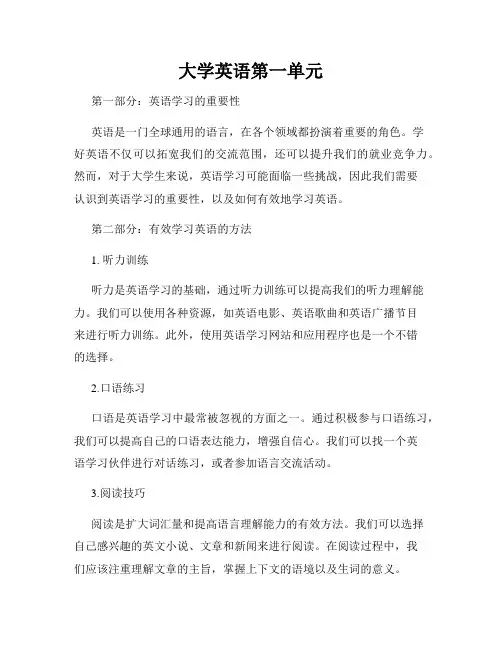
大学英语第一单元第一部分:英语学习的重要性英语是一门全球通用的语言,在各个领域都扮演着重要的角色。
学好英语不仅可以拓宽我们的交流范围,还可以提升我们的就业竞争力。
然而,对于大学生来说,英语学习可能面临一些挑战,因此我们需要认识到英语学习的重要性,以及如何有效地学习英语。
第二部分:有效学习英语的方法1. 听力训练听力是英语学习的基础,通过听力训练可以提高我们的听力理解能力。
我们可以使用各种资源,如英语电影、英语歌曲和英语广播节目来进行听力训练。
此外,使用英语学习网站和应用程序也是一个不错的选择。
2.口语练习口语是英语学习中最常被忽视的方面之一。
通过积极参与口语练习,我们可以提高自己的口语表达能力,增强自信心。
我们可以找一个英语学习伙伴进行对话练习,或者参加语言交流活动。
3.阅读技巧阅读是扩大词汇量和提高语言理解能力的有效方法。
我们可以选择自己感兴趣的英文小说、文章和新闻来进行阅读。
在阅读过程中,我们应该注重理解文章的主旨,掌握上下文的语境以及生词的意义。
4.写作练习写作是培养语言组织能力和提高语法水平的重要手段。
我们可以通过写日记、写文章和参加写作比赛等方式进行写作练习。
此外,可以请教老师或者同学对我们的作文进行修改和改进。
第三部分:应对英语学习挑战的技巧1.坚持学习英语学习并不是一蹴而就的过程,需要长期坚持。
我们可以制定学习计划,每天安排一定的学习时间,并且保持学习的兴趣和动力。
2.积极参与课堂课堂是我们学习英语最重要的场所之一。
在课堂上,我们要积极参与讨论,主动回答问题,与老师和同学进行互动交流,提高自己的口语表达能力和理解能力。
3.利用多种学习资源现代科技为我们提供了丰富的学习资源。
我们可以使用各种英语学习软件、网站、应用程序来辅助学习。
此外,还可以参加英语角、英语俱乐部等活动,与他人进行语言交流。
4.养成良好的学习习惯良好的学习习惯对于英语学习至关重要。
我们要保持规律的学习时间和学习环境,制定合理的学习计划,并且要有耐心和恒心。
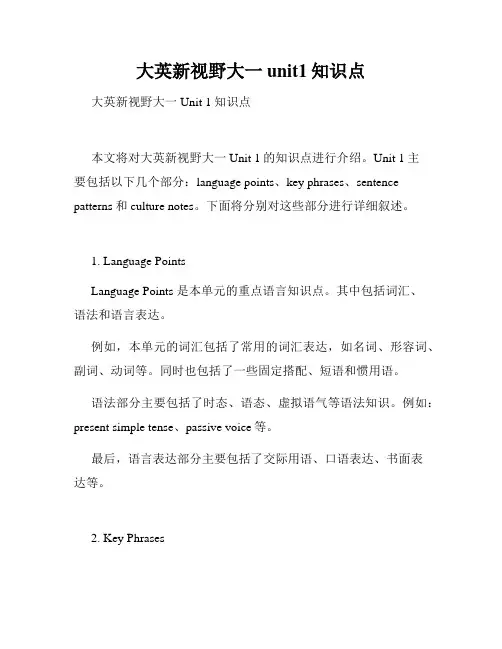
大英新视野大一unit1知识点大英新视野大一Unit 1知识点本文将对大英新视野大一Unit 1的知识点进行介绍。
Unit 1主要包括以下几个部分:language points、key phrases、sentence patterns和culture notes。
下面将分别对这些部分进行详细叙述。
1. Language PointsLanguage Points 是本单元的重点语言知识点。
其中包括词汇、语法和语言表达。
例如,本单元的词汇包括了常用的词汇表达,如名词、形容词、副词、动词等。
同时也包括了一些固定搭配、短语和惯用语。
语法部分主要包括了时态、语态、虚拟语气等语法知识。
例如:present simple tense、passive voice等。
最后,语言表达部分主要包括了交际用语、口语表达、书面表达等。
2. Key PhrasesKey Phrases 是本单元的重点短语。
通过掌握这些短语,能更好地理解和应用在实际生活或者学习当中。
例如:in addition、as a result、on the other hand等常用的关键短语。
3. Sentence PatternsSentence Patterns 是本单元的重点句型。
这些句型可以帮助学生提高语言表达的能力。
例如:It is + adj. + to do sth.、Not only...but also...等句型。
4. Culture NotesCulture Notes 是本单元的文化知识点。
通过了解和学习这些文化知识,可以更好地了解和理解英语国家的文化背景。
例如:英语国家的传统节日、习俗等。
在学习大英新视野大一Unit 1知识点时,可以通过阅读教材中的相关内容,积极参与课堂讨论和活动,或者通过参考外部资源进行拓展学习。
同时,可以结合练习题和模拟考试来检验自己的学习效果,及时总结和反思,提高英语学习的能力。
总结起来,大英新视野大一Unit 1知识点包括Language Points、Key Phrases、Sentence Patterns和Culture Notes。
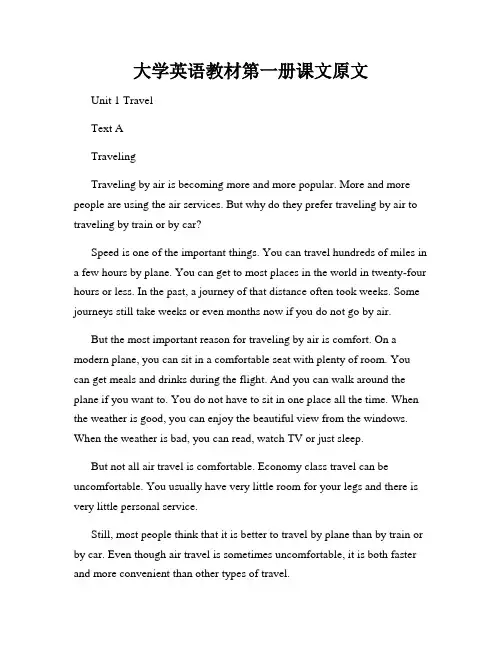
大学英语教材第一册课文原文Unit 1 TravelText ATravelingTraveling by air is becoming more and more popular. More and more people are using the air services. But why do they prefer traveling by air to traveling by train or by car?Speed is one of the important things. You can travel hundreds of miles in a few hours by plane. You can get to most places in the world in twenty-four hours or less. In the past, a journey of that distance often took weeks. Some journeys still take weeks or even months now if you do not go by air.But the most important reason for traveling by air is comfort. On a modern plane, you can sit in a comfortable seat with plenty of room. You can get meals and drinks during the flight. And you can walk around the plane if you want to. You do not have to sit in one place all the time. When the weather is good, you can enjoy the beautiful view from the windows. When the weather is bad, you can read, watch TV or just sleep.But not all air travel is comfortable. Economy class travel can be uncomfortable. You usually have very little room for your legs and there is very little personal service.Still, most people think that it is better to travel by plane than by train or by car. Even though air travel is sometimes uncomfortable, it is both faster and more convenient than other types of travel.ExercisesA. Choose the correct answers:1. Which one is an important reason for traveling by air?A. Speed.B. Comfort.C. Low cost.D. Adventure.2. How long does it take to travel by plane to most places in the world?A. A few hours.B. Two days.C. Weeks.D. Twenty-four hours or less.B. Complete the following sentences according to the text:1. Air travel is becoming more and more popular. _______ ______________ _______ the air services.2. On a modern plane, you can sit in a _______ _______ with plenty of room.3. _______ _______ _______ in the past, a journey of hundreds of miles often took weeks.Text BFour Ways of TravelingMany people like to travel. There are different ways of traveling, and they all have their advantages and disadvantages. Here we look at four ways of traveling.Two of the most popular ways are traveling by car and traveling by train. Traveling by car has some advantages. It is cheap, and you can stop whenever and wherever you want. You can also carry a lot of luggage with you. But there are also disadvantages. Sometimes there are traffic jams and accidents, and you can spend a lot of time waiting. Traveling by train is comfortable and you can see the country. You can move around on the train and you can eat in the restaurant car. But trains are not as flexible as cars. They only go to certain places, and you have to catch the train at certain times.Another way of traveling is by boat. If you like ships and the sea, traveling by boat is an excellent way to relax and enjoy yourself. Boats are big and comfortable, and you can have a very good time on board. You can eat and drink in the restaurants and bars, and you can do a lot of shopping. But moving around on a boat can be tiring. You can only go where the boat goes, and you may have to share your cabin with other people.Finally, there is air travel. It is the fastest and most comfortable way of traveling long distances. You can get to most places in the world quickly and easily by plane. You can eat and sleep on the plane, and you can watch TV or listen to music. But air travel is expensive. And sometimes airports can be crowded and noisy.So if you like traveling, what is the best way? It depends on where you want to go, how much money you have, and how much time you have.。
大学英语综合教程1简介《大学英语综合教程1》是一本面向大学英语学习者的综合教材。
本教材以培养学生的听、说、读、写、译等综合能力为宗旨,通过系统的学习和练习,帮助学生提高英语水平,掌握基本的语言技能和运用能力。
教材结构《大学英语综合教程1》共分为六个单元,每个单元的内容设计具有连贯性和渐进性,从简单到复杂,逐步拓展学生的英语能力。
第一单元:Greet and Meet本单元主要介绍英语中的问候语和自我介绍的方式,帮助学生建立良好的交际能力和基本的社交技巧。
第二单元:Daily Life通过学习日常生活中常用的英语词汇和句型,帮助学生掌握描述日常活动、表达习惯和喜好的能力。
第三单元:Family and Friendship本单元围绕家庭和友谊展开,让学生学会用英语表达对家人和朋友的关心和问候,提高交流的能力。
第四单元:Education and Study学习英语不仅仅是为了应付考试,更是为了促进自身的全面发展。
本单元将帮助学生掌握描述教育和学习相关的词汇和句型,为学生的学术生涯做好准备。
第五单元:Leisure and Hobbies休闲和爱好是人们放松身心、充实生活的重要方式。
本单元围绕休闲和爱好的话题展开,帮助学生扩展词汇量,增加交际的语言素材。
第六单元:Travel and Culture旅行是一种增长见识和拓宽视野的方式,也是提高语言交流能力的绝佳机会。
本单元将引导学生通过学习旅行和文化相关的词汇和句型,提高学生的跨文化交际能力。
学习特点《大学英语综合教程1》具有以下几个学习特点:1.任务驱动:教材通过任务驱动的方式,以实际应用为导向,使学生能够在实践中学习,提高语言运用能力。
2.听说读写结合:教材注重听说读写四项基本能力的综合训练,平衡地发展学生的英语综合技能。
3.交际导向:教材注重学生在真实场景中的交际实践,通过情境对话、问题讨论等活动,培养学生的交际能力。
4.循序渐进:教材内容设计由浅入深,循序渐进,符合学生语言水平的发展规律。
新标准⼤学英语1课⽂翻译UNIT1AR1 ⼤⼀新⽣⽇记星期⽇从家⾥出发后,我们开车开了很长⼀段时间才到达我住的宿舍楼。
我进去登记。
宿舍管理员给了我⼀串钥匙,并告诉了我房间号。
我的房间在6楼,可电梯坏了。
等我们终于找到8号房的时候,妈妈已经涨红了脸,上⽓不接下⽓。
我打开门锁,我们都⾛了进去。
但爸爸马上就从⾥⾯钻了出来。
这个房间刚刚够⼀个⼈住,⼀家⼈都进去,肯定装不下。
我躺在床上,不动弹就可以碰到三⾯墙。
幸亏我哥哥和我的狗没⼀起来。
后来,爸爸妈妈就⾛了,只剩下我孤零零⼀个⼈。
周围只有书和⼀个箱⼦。
接下来我该做什么?星期⼀早上,有⼀个为⼀年级新⽣举办的咖啡早茶会。
我见到了我的导师,他个⼦⾼⾼的,肩膀厚实,好像打定了主意要逗⼈开⼼。
“你是从很远的地⽅来的吗?”他问我。
他边说话边晃悠脑袋,咖啡都洒到杯托⾥了。
“我家离爱丁堡不太远,开车⼤约6个⼩时,”我说。
“好极了!”他说,接着⼜⾛向站在我旁边的那个⼥孩⼉。
“你是从很远的地⽅来的吗?”他问。
但不等那⼥孩⼉作出任何回答,他就说到,“好极了!”然后就继续向前⾛。
他啜了⼀⼝咖啡,却惊讶地发现杯⼦是空的。
妈妈打来电话。
她问我是不是见到了导师。
星期⼆我觉得有点⼉饿,这才意识到我已经两天没吃东西了。
我下楼去,得知⼀天三餐我可以在餐厅⾥吃。
我下到餐厅排进了长队。
“早餐吃什么?”我问前⾯的男⽣。
“不知道。
我来得太晚了,吃不上早餐了。
这是午餐。
”午餐是⾃助餐,今天的菜谱是鸡⾁、⽶饭、⼟⾖、沙拉、蔬菜、奶酪、酸奶和⽔果。
前⾯的男⽣每样⼉都取⼀些放到托盘上,付了钱,坐下来吃。
我再也不觉得饿了。
妈妈打电话来。
她问我有没有好好吃饭。
星期三早上9点钟我要去听⼀个讲座。
我醒时已经8:45了。
竟然没有⼈叫我起床。
奇怪。
我穿好⾐服,急匆匆地赶到⼤讲堂。
我在⼀个睡眼惺忪的⼥⽣旁边坐下。
她看了看我,问:“刚起床?”她是怎么看出来的?讲座进⾏了1个⼩时。
结束时我看了看笔记,我根本就看不懂⾃⼰写的字。
Unit 1 Personal RelationshipIn-Class Reading The Gift of Life以生命相赠1 炸弹落在了这个小村庄里。
在可怕的越南战争期间,谁也不知道这些炸弹要轰炸什么目标,而它们却落在了一所由传教士办的小孤儿院内。
2 传教士和一两个孩子已经丧生,还有几个孩子受了伤,其中有一个小女孩,8岁左右,双腿被炸伤了。
3 几小时后,医疗救援小组到了。
医疗小组由一名年轻的美国海军医生和一名同样年轻的海军护士组成。
他们很快发现有个小女孩伤势严重。
显然,如果不立即采取行动,她就会因失血过多和休克而死亡。
4 他们明白必须给小女孩输血,但是他们的医药用品很有限,没有血浆,因此需要匹配的血型。
快速的血型测定显示两名美国人的血型都不合适。
而几个没有受伤的孤儿却有匹配的血型。
5 医生会讲一点越南语,护士会讲一点法语,但只有中学的法语水平。
孩子们不会说英语,只会说一点法语。
医生和护士用少得可怜的一点共同语言,结合大量的手势,努力向这些受惊吓的孩子们解释说,除非他们能输一些血给自己的小伙伴,否则她将必死无疑。
然后他们问孩子们是否有人愿意献血来救小女孩。
6 对医生和护士的请求,孩子们瞪大眼睛,一声不吭。
此时小病人生命垂危。
然而,只有这些受惊吓的孩子中有人自愿献血,他们才能够得到血。
过了好一会儿,一只小手慢慢地举了起来,然后垂了下去,一会儿又举了起来。
7 “噢,谢谢,”护士用法语说。
“你叫什么名字?”8 “兴,”小男孩回答道。
9 兴很快被抱到一张床上,手臂用酒精消毒后,针就扎了进去。
在整个过程中,兴僵直地躺着,没有出声。
10 过了一会儿,他发出了一声长长的抽泣,但立即用那只可以活动的手捂住了自己的脸。
11 “兴,疼吗?”医生问。
12 兴默默地摇了摇头,但一会儿忍不住又抽泣起来,并又一次试图掩饰自己的哭声。
医生又问是不是插在手臂上的针弄疼了他,兴还是摇了摇头。
13 但现在,偶尔的抽泣变成了持续无声的哭泣。
The Gift of Life1.The bombs landed in the small village. Nobody knows what these bombs were supposed to hit during the terrible Vietnam War, but they landed in a small orphanage run by a missionary group.[2] The missionaries and one or two children were killed, and several children were wounded, including one young girl, about 8 years old, who suffered wounds to her legs.[3] A couple of hours later, medical help arrived. The medical help was a young American Navy doctor and an equally young Navy nurse. They quickly found one young girl to be very badly injured, and it was clear that without immediate action, she would die from loss of blood and shock.[4] They saw that she had to have blood, but their limited supplies did not include plasma, so a matching blood type was required. A quick blood typing showed that neither American had the correct blood type. Several of the uninjured orphans did.[5] The doctor spoke a little Vietnamese, and the nurse spoke a little high-school French. The children spoke no English but some French. Using what little common language they could find, together with a lot of sign language, they tried to explain to these frightened children that unless they could give some blood to their little friend she would certainly die. Then they asked if anyone would be willing to give blood to help.[6] Their request was met with wide-eyed silence. Their little patient's life hung in the balance. Yet they could only get the blood if one of these frightened children would agree to give it. After several long moments, a little hand slowly went up, dropped back down, and a moment later went up again.[7] "Oh, thank you," the nurse said in French. "What is your name?"[8] "Heng," came the reply.[9] Heng was quickly laid on a bed, his arm cleaned with alcohol, and the needle insertedinto his arm. Through all of this Heng lay stiff and silent.[10] After a moment, he let out a long sob, quickly covering his face with his free hand.[11] "Is it hurting, Heng?" the doctor asked.[12] Heng shook his head silently, but after a few moments another sob escaped, and again he tried to cover up his crying. Again the doctor asked him if the needle in his arm was hurting, and again Heng shook his head.[13] But now his occasional sob turned to a steady, silent crying, his eyes held tightly shut, his fist in his mouth trying to stop his sobs.[14] The medical team now was very worried because the needle should not have been hurting their tiny patient. Something was obviously very wrong. At this point, a Vietnamese nurse arrived to help, and seeing the little one's tears, spoke rapidly in Vietnamese, listened to his reply, and quickly answered him again. Moving over to pat his head as shetalked, her voice was gentle and kind.[15] After a moment, the little boy stopped crying, opened his eyes, and looked questioningly at the Vietnamese nurse. When she nodded, a look of great relief spread over his face.[16] Looking up, the Vietnamese nurse said quietly to the Americans, "He thought he was dying. He misunderstood you. He thought you had asked him to give all his blood so the little girl could live."[17] "But why would he be willing to do that?" asked the Navy nurse.[18] The Vietnamese nurse repeated the question to the little boy, who answered simply, "She's my friend."[19] Greater love has no man than this, that he lay down his life for a friend. (595 words)Love Thy Neighborby Andy Rooney[1] It seems to me that neighbors are going out of style in America. The friend next door from whom you borrowed four eggs or a ladder has moved, and the people in there now are strangers.[2] Some of the old ideas about neighbors are probably silly, and it may be just as wellthat our relations with our neighbors are changing. The religious teaching to "Love Thy Neighbor" was probably a poor translation of what must have originally been "Respect Thy Neighbor".Love doesn't exist just because we want it to.[3] Fewer than half the people in the United States live in the same house they lived in five years ago, so there's no reason to love the people who live next door to you just because they happened to buy a house next door to yours. The only thing neighbors have in common to begin with is being close, and unless something more develops, th atisn ' t reason enoughto bebest friends. It sometimes happens, but the chancesare very small that your neighbors willbe your choice as friends. Or that you will be theirs, either.[4] The best relationship with neighbors is one of friendly distance. You say hello, you sometimes talk if you see them in the yard, you discuss problems and you help each other when help is needed. The bushes or the fence between you is not a cold shoulder, but a clear boundary. We all like clearly defined boundaries for ourselves.[5] If neighbors have changed, neighborhoods have not. They still have the same parts. If you live in a real neighborhood you can be sure most of the following people will be found there:-One family with more children than they can take care of.-A dogthat gets into garbage cans.-One big, beautiful home with a family so rich that they really aren't part of the neighborhood.-A bad child who steals or sets fire to things, although no one has ever been able to prove it.-People who leave their Christmas lights up until March.-Someone who doesn't cut their grass more than twice a summer.-Someone who cuts their grass twice a week and one of the times always seems to be Sunday morning at 7:30.-A family that never seems to turn off any lights in the house.-A teenager who plays the radio too loud in the summer with the windows open.-Someone who leaves their barking dog out until 11:30 most nights.-One mystery couple. They come and go but hardly anyone ever sees them and no one knows what they do.-A couple that has loud parties all the time with guests that take an hour to leave once they get outside and start shouting good-bye to each other.-Someone who doesn't pull the shades.[6] It is easier to have a longing about a past neighborhood than about a past community, but a community is probablya better unit. A neighborhood is just a group of people who live close together, but a community is a group of people who put aside their own concerns to getsome important things done for a larger group. (529 words)We All Need Friendsby Melinda Marshall[1] Having good old friends is a good thing, but making new ones can be even better. No matter what age we are, all of us appreciate the support and help which friends give us. The help may be for only a small thing, or it may be for something that could save our life. The size of the help or support is not really the most important thing, but the fact of having friends is very important.[2] I've just made a new friend, Joan. She's not just another person I can talk with or wave to as we pass one anotheron the street, but a good friend. She is someone who will go out with me for lunch, or drop by my home for a cup of tea. She is someone who will listen and make me feel understood the next time I may feel sad or worried for no apparent reason.[3] This is no small matter for me. I barely have enough time or energy to keep up with my old friends, let alonemake new ones. But, as I grow older -- and I am now 35 years old -- it is important to me to have a safety net of friends. Holes keep opening up in the net as old friends move away. I've got to spend the energy now to include new friends.[4] Making friends is a lot like dating after a terrible breakup. You hesitate and drag your feet because you can't believe you have to start over again. But when you do, it's not half as hard as you thought it would be, and it's twice as rewarding as you might have hoped.[5] For example, I almost didn't meet Joan who is now one of my best friends. We were at the city swimming pool, waiting for our 5-year-old sons to finish their swimming lessons. Joan was reading a book that I had read for my book club, and I wanted to say something, but didn't. It was almost as if I'd lost the ability to say hello.[6] In the locker room we were together again as our sons got dressed and ready to go home.I said, mostly to her back, "What do you think of Amy Tan's writing?" She turned around, and like a teenager, I blushed. "Oh," she said, "I'm really enjoying The Bonesetter's Daughter. I read Joy Luck Club, and she's been my favoritewriter since then."[7] We talked after the next two lessons, compared our reading lists, and chased our sons out of the dressing room again. By the fifth swimming lesson, we arranged to spend a day together shopping in the city. That's pretty wild, don't you think for a person of my age?[8] I didn't always choose my friends. For years, I let fate choose them for me. A new job, a new city, an expensive apartment made me be friends with people I'd never have said hello to otherwise. But, as I grew older I grew impatient with some of my friends, and I decided that accidental relationships don't always survive changes in life. Those types of friends don't often help you during life's difficult times when you really need help.[9] We can be ourselves with our friends, and that is a wonderful thing; too precious a gift to deny other friends. It really doesn't take that much time, or that much effort to share the gift of making friends. (573 words)11111111111111111111111111111111111111111111111111111111111111111111111Special Delivery[1] Arriving at the airport, I discovered that my brother's flight had been delayed for an hour. Usually when I wait around the airport to meet a flight, I pass the time by watching planes land and take off, but that evening I had a bad headache.I thought the noise of jet engines might make it worse, so I decided to walk around inside the airport for a while.[2] As I was walking by the shops, I happened to see a display of flight bags, which reminded me of my briefcase. Irealized that I was not carrying it now. Quickly I tried to remember where I might have left it. Knowing that I had not stopped anywhere since I left the airline ticket counter, I concluded I must have put it down there. I hurried back to get it, but my briefcase was nowhere in sight. At first I was sure that somebody had just walked off with it, but then I realized there was a chance that whoever found it might have turned it in at the counter, I waited in line for my turn at the counter and then I described the briefcase and asked if by any chance it had been turned in. The agent shook his head. Then I glanced over his shoulder at the conveyor belt that was moving baggage from the check-in counter down to the loading area and I shouted, "There it is!" But just as the agent turned to look, the briefcase reached the end of the conveyor belt and vanished from view .[3] "Did you see your briefcase?" the agent asked.[4] "Yes!" I exclaimed. "It just went through that opening over there. How can I get it back now?"[5] "That's no problem," replied the agent. "Just give me your baggage claim check and I think we can catch it beforeit's loaded on a flight."[6] "But I don't have a claim check!" I replied. "I didn't check it! I'm not going anywhere.I'm just here to meet a flight." Calming myself down a bit, I explained what had happened and suggested that the bag had probably been turned in at the counter where one of the agents had checked it with other baggage and placed it on the conveyor belt.[7] The agent told me that the only way he could find it would be to have a claim form with a description of what the briefcase looked like. By the time I filled out the form and the agent called down to the baggage area, the briefcase had already been loaded on one of the flights, but they didn't know which one. The agent took my phone number and promised they would call as soon as they found the briefcase. Even though I lived in Sioux City, which was an hour-and-a-half drive away, they would deliver it to my address as soon as they got it back.[8] My brother's flight arrived and, after getting his suitcases, we headed for my car in the parking lot. During the drive home I told him all about the briefcase. When we got home and were unloading the car, I could hardly believe my eyes when my brother took a briefcase out of the car. The briefcase I thought I had lost had never been taken into the airport! It had been on the floor in the back seat. I realized that at that moment the airline people were checking each piece of baggage on their Denver, St. Louis and Chicago flights, looking for my briefcase. The thought of having to call and tell them I had found it in my car was painful.[9] As we walked in the house the telephone was ringing. Answering it, I was shocked when an airline worker said, "We have good news for you! We found your briefcase in Denver. It should be here by eleven o'clock and will be delivered to you shortly after midnight." ( 657 words)Memory and the Human Brain[1] Is it possible to know exactly how memory works in humans and other intelligent animals? Some people believe thatit never will be. But some scientists, who are studying the function of the brain and its relationship to memory, do not share this view.[2] It is now well known that memory, like other brain functions, is located in specific parts of the brain in humans. These parts may be identified and their location in the brain may be established. They work together in both short-term and long-term memory. Although scientists have not yet fully studied the brain, much progress has been made. One day the mind will be described fully both in biological and mental terms.[3] Some people claim that they can recall things which happened many years ago. Have you ever had the same experience? The fact is, these long-term memories are very accurate in detail and can be compared to a movie in the brain. Once we start the movie going, we experience the entire memory. This movie in the mind (brain) is the reason why we have a sense of self. We know who we are and we know that we exist.[4] Try to think of something like a long poem, a joke, or a song you learned in early elementary school. If you remember it, you can often repeat the entire poem or song in quite accurate detail. You will often remember the reason why you were asked to learn this poem or song. It may have been for a show to which families were invited, or it may have been a pleasant holiday meeting where your parents asked you to tell them what you had learned.[5] However, sometimes you cannot even remember the details of things that are part of your short-term memory. This happens when you are required to remember many things, and especially if you do not feel well, or if you are not well rested.[6] All of us have "learned" facts which we thought would help us do well on an exam in school. But often, when we tried to recall the facts, we could not, or we could think of only a little of what we thought we had learned.[7] Have you ever experienced anything like this: you were to call a good friend, but you couldn't recall the telephone number? You were shopping in the grocery store for your mother, but you couldn't remember exactly what you were expected to get for her. Even when things have been learned well in our memory, we find that we cannot recall them when we need them. It may be that ten minutes later, or the next day, our memory will tell us what these things were, but it is true that the memory is not always perfect. Of course it is possible to train ourselves to remember things better. This usually involves repeating the facts to ourselves, or even writing them a few times until they are easily remembered.[8] Memory allows us to remember facts, see them in the light of new information, and make decisions that are important to us. It would be nice if it were always perfect, and it will be nice when we know even more about how memory works on a biological and mental basis. ( 548 words)The Benefits of Forgetting[1] We have all wished, at some time or other, for a perfect memory. We want to be able to remember things in exact detail. It's too bad that we forget so much that we have learned in school and at home. How can we make a realisticopinion of ourselves if our recall of the past is neither accurate nor complete?[2] Yet a perfect memory is not always as good as one might suppose. There was the story about a Russian journalist, S. He could remember long lists of numbers and words and many pages of a telephone book after seeing them for only a few seconds. He could repeat these lists both forward and backward, even after many years had passed. He also remembered the conditions under which he had first learned the material.[3] S. used various memory "tricks" to help his memory. Many of these tricks involved forming mental pictures. But you shouldn't envy him, for he had a serious problem: he could not forget. Those mental pictures kept coming to his mind. They distracted him and made it difficult for him to concentrate. At times he even had trouble holding a simple conversation because the other person's words would make him recall memories of other things. In fact, he was described as rather dull. At last, S. was unable to work at his job. He supported himself by traveling from place to place as a "memory expert", showing off his abilities for people. There have been other examples of people with this sort of memory problem. They come from many different countries and use many different languages.[4] Perhaps you still think a perfect memory would be a good thing to have. Imagine, then, for a moment, what it would be like to remember everything. Each time you recalled the past, you would remember not only the jewels of experience but the worthless stones as well. Remembering might take hours instead of moments. The confusion in your mind might grow beyond your ability to organize it well. With a perfect memory, you might also remember things that may be best forgotten. Would you really want to recall every angry quarrel, every mistake you've made, every painful moment of your life? How would total recall affect your relationships with family and friends? Could it be that the success of a close relationship depends on a certain amount of forgetting? Could it be that self-confidence and optimism are only possible if we lock some bad memories in a back drawer of memory, and stop thinking about them? If you keep all these things in mind, you can understand why a perfect memory is not the best type of memory to have.[5] Like remembering, a certain degree of forgetting helps us to lead a normal life. Where is the line between helpful forgetting and harmful forgetting? If you had the choice, what would you choose to remember more clearly, and what would you allow to disappear from your memory? Think about it. ( 503 words)111111111111111111111111111111111111111111111111111111111111111111111111Communication Without Words[1) When you learn a foreign language you must learn more than just the vocabulary and the grammar. To communicate successfully in speech, you must also learn the nonverbal language, or "body language," of that culture. "Body language" is a term used to describe facial expressions, gestures, and other movements of the body that send messages. This means of communication is so important that we may actually say more with our movements than we do with words.[2] Speaking a foreign language is sometimes difficult because we may not understand the nonverbal signals of another culture, or they may mean something very different from what they mean in our own culture. For example, nodding the head up and down is a gesture that communicates a different message in different parts of the world. In North America, it means "I agree." In the Middle East, nodding the head down means "I agree" and up means "I disagree." In a conversation among Japanese, it often simply means "I am listening." One Japanese student in the United Stateslearned the difference the hard way. While speaking with a salesman, the student nodded his head politely to show that he was paying attention. The next day the salesman brought a new washing machine to the student's apartment.[3] Eye contact is also very meaningful, but it, too, can mean different things in different countries. In some Spanish-speaking countries, children show respect to an older person by not looking directly into the person's eyes during a conversation. In other countries, looking into a person's eyes is expected. For example, if you don't do it in the United States, people may think that you are afraid, embarrassed, or angry.[4] In many places in the world there are two basic gestures that are used to tell someone to come closer. In Asia, the sign is a wave of the hand while curling the fingers downward, the same way some North Americans wave good-bye to children. North Americans make almost the same gesture to tell someone to come closer, but they curl their fingers upward. Visitors to other countries must be aware of the difference or they may send the wrong message.[5] Although we rarely think about it, the distance that we stand from someone during a conversation is also an important part of communication. Generally, North Americans prefer more space than do Latin Americans and people from the Middle East. At an international meeting a pair of diplomats may move slowly across a room as one of them tries to increase the personal conversation distance and the other tries to decrease it. The person who prefers more distance usually loses the fight when he finds himself with his back against the wall.[6] Although we spend many years learning how to speak a foreign language, misunderstandings can occur unless we also know the nonverbal language and the correct behavior of that culture. We are not really prepared to communicate in a foreign language unless we know whether to shake hands or bow, when to sit and stand, and how to behave in unfamiliar situations. Perhaps a fifth skill ought to be added to the four traditional communication skills of reading, writing, speaking, and listening: cultural awareness. ( 535 words)Learn How to Listen[1] Bad listening habits can hurt you a lot in your daily life. Much of your success, both in your work and social life, is related to how you listen. A number of major industries and more than twenty leading colleges have become very concerned about our bad listening habits. They have set up "listening clinics" and courses to find out what is wrong —and whatto do about it![2] My own experience as a teacher in one of these clinics has taught me that many people who seem to be listening miss important points. Therefore, they draw wrong conclusions from what is said. That is a serious problem when you consider our attitudes toward other people and success on the job.[3] What are the faulty hearing habits that hurt us in so many ways? Here are some of the more common ones I've observed in a close study of my many clinic students.[4] Our minds won't wait. Our thoughts can race along from four to ten times faster than most people speak. So while we are waiting to hear someone's words, our thoughts tend to wander. And sometimes they remain away too long.[5] We think we know already. We're so sure we know what the speaker is going to say that we listen with just "half an ear."[6] We're looking, not listening. How often in introductions has a name failed to stick because your mind was on the way someone looked or acted? For the same reason, and far more often than you may think, other information fails to come through.[7] We are busy listeners. We try to listen while giving part of our attention to a newspaper, or a radio or TV program. Outside noises also bid for a share of our attention. No wonder we don't really "hear."[8] These are some of the common listening faults. Fortunately, with little effort, you can correct any of them. I suggest these three ways to help make you a better listener.[9] Learn to concentrate. It's an important part of listening. Practice such games as "Take 2, plus 3, minus 5, plus 4, times 2, minus 6 —what's the answer?" Similar exercises are used in listening-training courses.[10] Cut out distractions. Resolve to put aside the newspaper and stop half-listening to a radio or TV program when someone is trying to talk to you.[11] Repeat instructions. Practice repeating instructions and directions correctly. Unless you can do so, you obviously will not be able to carry them out properly.[12] Good listening isn't easy. Hearing, understanding, and remembering take a great deal of energy. It is hard to listen properly and do anything else at the same time. But good listening pays off.[13] If you recognize and correct any listening faults that may be hurting you, good things may happen. You may listen your way to closer friendships and better relations with your family. You may also get larger paychecks and be more successful in life. ( 492 words)How to Talk to Anyone, Anytime, Anywhere[1] The ability to talk well is one of the greatest pleasures in life and can bring with it some of life's greatest rewards. It is not always easy. But the more you work at it, the easier it will become. There are six basic things to keep in mind if you wish to be able to talk to anyone, anytime, anywhere.[2] First of all, you don't have to be quotable. Most of the time, people are not expecting deep words of wisdom from you. They will not be waiting to record what you say. Therefore, just open your mouth and start talking. Hopefully it will be interesting enough for people to listen.[3] Secondly, the right attitude —the will to talk —is essential to becoming a better talker. Try to be enthusiastic about talking with people. They will respond positively to your enthusiasm and you will find that you really do become enthusiastic. On the other hand, it is easy forothers to notice if you have no enthusiasm for talking with them, and they, in turn, will respond negatively.[4] A third point to remember is that you should take turns. Careful listening makes you a better talker. Also good follow-up questions are the mark of a good conversationalist. One way everyone learns is by listening. The more you learn, the better prepared you are to be a good conversationalist.[5] A fourth essential point is that you should try to broaden your horizons. The best conversationalists are able to talk about issues and experiences beyond their daily lives. You can expand your world through travel, but you can also do it without leaving your own home.Of course, you can learn from reading. However, an essential thing to remember is that people with backgrounds different from your own can broaden your conversational material and your thinking.[6] A fifth point to remember is that you should not keep your conversation too serious for too long. A sense of humor is helpful and you can lighten a conversation by sometimes telling a joke about yourself.[7] Last, you should be genuine when in conversation with others. You should be as open and honest with your conversation partners as you would want them to be with you. You should be willing to reveal what your background is and what your likes and dislikes are. That is an essential part of the "give-and-take" of conversation, part of getting to know people, and their getting to know you. Just be honest about yourself, and you won't go wrong.[8] Whether you're talking to one person or many, the rules are the same. It's all about making a connection. Show empathy, enthusiasm and a willingness to listen, and you can't help becoming a master of talk. ( 460 words)111111111111111111111111111111111111111111111111111111111111111111111111Fresh Start[1] I first began to wonder what I was doing on a college campus when my parents drove off, leaving me standing pitifully in a parking lot. I decided I wanted nothing more than to find my way safely to my dorm room. It seemed that everyone on campus was watching me. My plan was to keep my ears open and my mouth shut and I hoped no one would notice I was a freshman.[2] The next morning I found my first class and marched in. Once I was in the room, however, another problem awaited me. Where to sit? After much hesitation I chose a seat in the first row and to the side.[3] "Welcome to Biology 101," the professor began. Oh, God, I had thought it was a literature class. A cold sweat broke out on the back of my neck. I groped for my schedule and checked the room number. I was in the right room but the wrong building.[4] So now what? Get up and leave in the middle of the lecture? Wouldn't the professor be angry? I knew everyone would stare. Forget it. I settled into my chair and tried to look as serious as a biology major might be.[5] After class I felt a little hungry, and I hurried to the cafeteria. I piled my tray with sandwiches and was heading for the seat when I accidentally stepped in a large puddle of ketchup. My food tray tipped and I lost my balance. As my rear end met the floor, I saw my entire life pass before my eyes; it ended with my first day of college classes.[6] In the seconds after my fall I thought how nice it would be if no one had noticed. But as all the students in the cafeteria came to their feet, cheering and clapping, I knew they had not only noticed, they were determined that I would。
大学大一英语教材第一单元单词英语作为一门重要的国际语言,对于大学生来说,具备一定的英语水平至关重要。
作为大一学生,我们需要从最基础的单词入手,逐步提高自己的英语词汇量。
本文将介绍大学大一英语教材第一单元的一些重要单词,以帮助同学们更好地学习和记忆这些词汇。
1. apple(n.) - 苹果苹果是我们生活中常见的水果之一,它可供生食或加工制作成其他食品。
在英语中,苹果的表达是“apple”。
2. book(n.) - 书籍在大学学习过程中,我们离不开各种各样的书籍。
在英语中,书籍可以用“book”来表示。
3. computer(n.) - 计算机随着科技的发展,计算机已经成为我们生活中必不可少的工具之一。
在英语中,计算机可以用“computer”来表示。
4. door(n.) - 门门是连接房间和走廊的开口,我们经常使用门来进出不同的空间。
在英语中,门可以用“door”来表示。
5. friend(n.) - 朋友朋友在我们的生活中扮演着重要的角色,他们给予我们支持和帮助。
在英语中,朋友的表达是“friend”。
6. class(n.) - 班级大学中,学生们会被划分到不同的班级中进行学习和交流。
在英语中,班级可以用“class”来表示。
7. university(n.) - 大学大学是我们接受高等教育的地方,为我们的未来发展奠定基础。
在英语中,大学可以用“university”来表示。
8. listen(v.) - 听听是我们获取信息的一种方式,也是语言学习的重要环节。
在英语中,听可以用“listen”来表示。
9. speak(v.) - 说话说话是我们与他人交流沟通的方式,也是语言运用的核心要素。
在英语中,说话可以用“speak”来表示。
10. write(v.) - 写写是我们进行书面表达的行为,也是学习和工作中常见的任务。
在英语中,写可以用“write”来表示。
以上是大学大一英语教材第一单元中一些常见的单词。
大学大一英语教材翻译Translation of First-Year College English TextbookIntroduction:概述:As the first-year college English textbook, this material aims to provide a comprehensive foundation for students' English language skills. It covers various aspects of English, including grammar, vocabulary, reading comprehension, writing, and speaking. The textbook adopts a communicative approach and incorporates interactive activities to enhance students' English proficiency and understanding of Western culture. In this translation, we will discuss the key characteristics and contents of the textbook.I. Unit 1: Introduction to English Language and Culture第一单元:英语语言与文化概述Unit 1 introduces students to the English language and its cultural significance. It covers the history of English, its development, and its global spread. The unit explores the diversity of English-speaking countries and cultures, emphasizing the importance of cultural understanding in language learning. Students engage in vocabulary exercises, reading comprehension activities, and discussions to build a solid foundation of knowledge.II. Unit 2: Grammar Essentials第二单元:语法要点Unit 2 focuses on essential grammar skills necessary for effective communication. It covers topics such as tenses, sentence structure, parts of speech, and common grammatical errors. Through interactive exercises and practice, students learn how to construct grammatically correct sentences and express their ideas accurately. Additional resources, such as online quizzes and grammar reference materials, are provided to supplement students' learning.III. Unit 3: Vocabulary Expansion第三单元:词汇扩展Unit 3 aims to expand students' vocabulary bank by introducing them to a wide range of words and phrases. It incorporates various learning techniques, including word associations, context-based exercises, and word usage in different contexts. Students are encouraged to acquire new vocabulary through reading, listening, and speaking activities, enabling them to express themselves more effectively in English.IV. Unit 4: Reading Comprehension第四单元:阅读理解Unit 4 focuses on improving students' reading comprehension skills. It includes a variety of texts, such as articles, essays, and short stories, covering different genres and themes. Students learn how to analyze and understand the main ideas, supporting details, and implicit meanings in the texts. Furthermore, they are encouraged to engage in discussions and share their interpretations, promoting critical thinking and cultural awareness.V. Unit 5: Writing Skills第五单元:写作技巧Unit 5 aims to enhance students' writing skills in English. It covers various types of writing, such as descriptive essays, argumentative essays, and formal letters. Students learn how to structure their writing, develop coherent paragraphs, and use appropriate vocabulary and grammar. Through peer feedback and revision exercises, students improve their writing style, organization, and clarity of expression.VI. Unit 6: Speaking and Listening第六单元:口语与听力Unit 6 focuses on developing students' oral communication and listening skills. It includes engaging dialogues, role-plays, and group discussions to simulate real-life communication situations. Students practice expressing their opinions, giving presentations, and actively listening to others. Pronunciation exercises help students develop clear and accurate spoken English.Conclusion:结论:This translation provides an overview of the first-year college English textbook. It highlights the essential components and objectives of each unit, emphasizing the holistic approach adopted in teaching English language and culture. By following the textbook, students can expect to improve their language proficiency, critical thinking, and cross-cultural understanding.The translation aims to support educators and students in achieving their learning goals effectively.。
Oxford UniversityOxford University is the oldest university in Britain and one of the world's most famous institutions of higher learning. Oxford University was established during the 1100's. It is located in Oxford, England, about 80 kilometers northwest of London. 牛津大学是英国最古老的大学,也是世界最著名的高等学府。
牛津大学始建于12世纪。
它位于英格兰的牛津,在伦敦西北约80公里处。
The university has over 16,300 students (1999-2000), almost a quarter of these students are from overseas and more than 130 nationalities are represented. It consists of 35 colleges, plus five private halls established by various religious groups. Three of the five private halls are for men only. Of the colleges, St. Hilda's and Somerville are for women, and the rest are for men and women. 牛津大学有16,300多名学生(1999-2000),其中留学生占将近四分之一。
他们来自130多个国家。
牛津大学有35个学院,还有5个由不同宗教团体建立的私人学院。
5个私人学院中,有3个只招男生。
学院中,圣希尔达和萨默维尔学院只收女生,其他均为男女兼收。
At Oxford, each college is a corporate body distinct from the university and is governed by its own head and fellows. Most fellows are college instructors called tutors, and the rest are university professors and lecturers. Each college manages its own buildings and property, elects its own fellows, and selects and admits its own undergraduate students. The university provides some libraries, laboratories, and other facilities, but the colleges take primary responsibility for the teaching and well-being of their students.牛津的每个学院都是独立于大学的实体,由该学院的院长和管委会成员负责管理。
部分管委会成员都称为导师的学院教师,其余的是大学教授和讲师。
每个学院管理自己的房产和资产,遴选自己的管委会,选择和招收自己的本科生。
大学提供某些图书馆、实验室和其他设施,但教学和学生生活主要由各学院负责。
Each student at Oxford is assigned to a tutor, who supervises the student's program of study, primarily through tutorials. Tutorials are weekly meetings of one or two students with their tutor. Students may see other tutors for specialized instruction. They may also attend lectures given by university teachers. Students choose which lectures to attend on the basis of their own special interests and on the advice of their tutors.牛津大学给每个学生指定一个导师,他主要通过辅导课监督学生的学习。
导师每周和1到2名学生见面一次,学生如需专业指导,还可以去约见其他的导师,也可选听大学老师讲授的课程。
学生选听什么课程是根据自己的兴趣和导师的建议而定的。
The university, not the individual colleges, grants degrees. The first degree in the arts or sciences is the Bachelor of Arts with honors. Oxford also grants higher degrees, diplomas, and certificates in a wide variety of subjects. 学位由大学授予,而不是各个学院。
最低文科或理科学位是优等文学学士。
牛津还在其他众多学科领域授予最高的学位,颁发文凭和证书。
The Rhodes scholarship program enables students from the United States, Canada, and many other nations to study at Oxford for a minimum of two years. The British government grants Marshall scholarships to citizens of the United States for study at Oxford and other universities that are located in Britain.罗兹德奖学金面向美国、加拿大和很多其他国家的学生,为他们提供至少两年的牛津学习费用。
英国政府为在牛津和其他英国境内的大学里求学的美国公民提供"马歇尔奖学金"The competition for scholarships and grants is, however, extremely strong and there are usually strict requirements. Students should check carefully that they are eligible to apply for a particular scholarship before making an application as most of the schemes are restricted to certain nationalities and/or programs.然而,奖学金和助学金的竞争极其激烈,而且通常要求很严。
学生们在申请某一项奖学金之前应仔细核查是否有资格,因为多数奖学金对学生国籍和(或)课程都有限制。
The students and staff at Oxford are actively involved in over 55 initiatives (2001), including visits to more than 3,700 schools and colleges, to encourage the brightest and best students to apply to Oxford, whatever their background.牛津师生员工积极参与主动招生的活动,2001年这种活动有55项以上,包括走访3,700所中学,以鼓励优秀学生报考牛津大学,而不管其背景如何。
The university has been named the UK's most innovative university in the Launchit 2001 competition, which aimed to discover which British university has demonstrated the greatest achievements in innovation and enterprise across the broadest range of activity. In the national Teaching Quality Assessment exercises for 2000, Oxford was awarded top marks in six out of ten subjects assessed.在2001年度的"创新"竞赛中,牛津大学被授予英国最具创新精神的大学称号。
该竞赛旨在发现哪一所英国大学在最广的领域内取得了创新和进取的最大成就。
在2000年全英教学质量评估中,牛津在所评估的10个科目中有6科得分高居榜首。
Oxford, Stanford and Yale Universities have recently become partners in a joint'distance learning' venture, the Alliance for Lifelong Learning, which will provide online courses in the arts and sciences. 牛津、斯坦福和耶鲁三所大学最近合作开发了"远程学习"项目"终生学习联盟",该项目将提供文科和理科的在线课程。
The mission of Oxford is to aim at achieving and maintaining excellence in every area of its teaching and research, maintaining and developing its historical position as aworld-class university, and enriching the international, national, and regional communities through the fruits of its research and the skills of its graduates.牛津的使命是在教学和研究的各个领域达到并保持领先地位,保持和加强其世界名校的历史地位,通过其研究成果和毕业生的技能促进地区、全国和全球的发展。